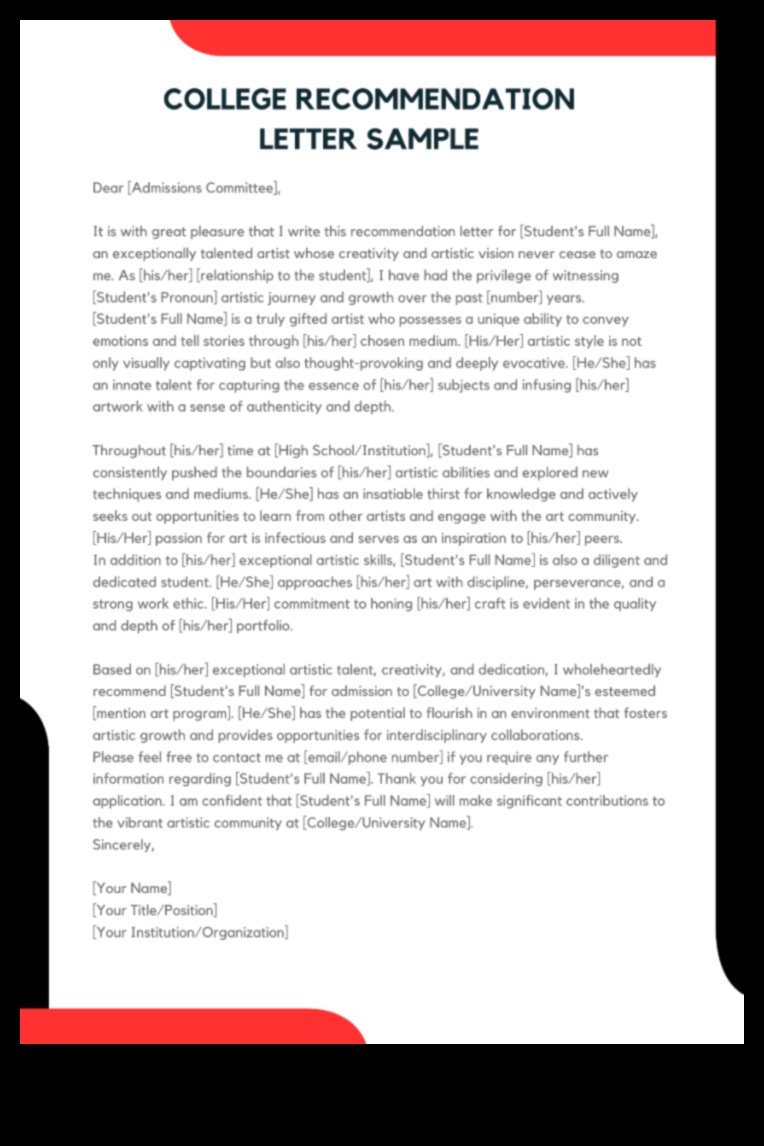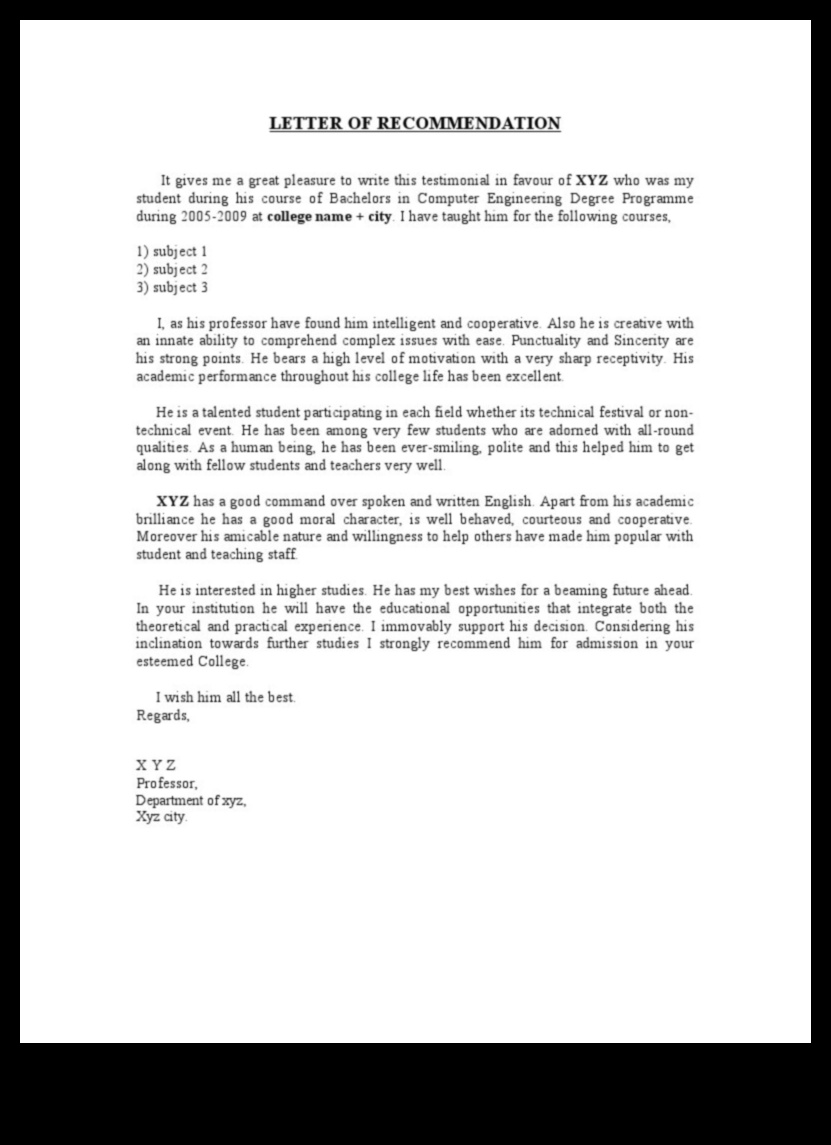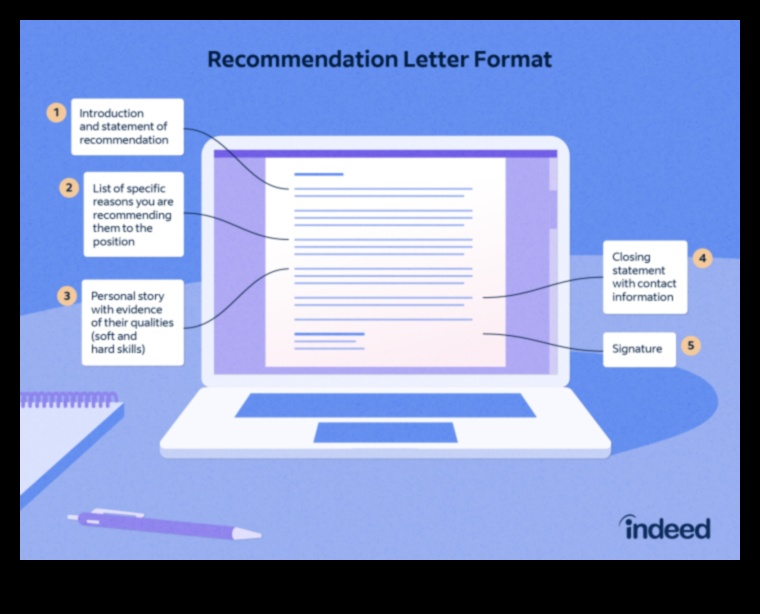
How to write a recommendation letter for undergraduate admission
A strong recommendation letter can be the difference between getting into your dream college and being waitlisted or rejected. Here are some tips for writing a recommendation letter that will make a positive impression on admissions officers:
1. Start with a strong introduction. The first few sentences of your letter should grab the attention of the admissions officer and make them want to read more. You can do this by highlighting the applicant’s unique qualities or accomplishments.
2. Provide specific examples of the applicant’s strengths. Don’t just say that the applicant is a hard worker or a good student. Back up your claims with specific examples of their work ethic or academic achievements.
3. Personalize the letter. Make sure the letter sounds like it’s coming from you, not a template. Share your own personal experiences with the applicant and explain why you believe they would be a good fit for the college.
4. Proofread your letter carefully. Make sure your letter is free of errors in grammar, spelling, and punctuation.
5. Thank the person for their time and consideration. End your letter by thanking the admissions officer for their time and consideration.
Here is an example of a strong recommendation letter for undergraduate admission:
Dear Admissions Committee,
I am writing to recommend [applicant’s name] for admission to [college name]. I have had the pleasure of knowing [applicant’s name] for the past four years as their [teacher/coach/mentor]. During that time, I have been consistently impressed by their [academic achievements/leadership skills/personal qualities].
[Applicant’s name] is an outstanding student. They have consistently earned top grades in my class, and they have a strong work ethic. They are also a gifted writer and speaker. In addition to their academic achievements, [applicant’s name] is also an active leader in our school community. They have served as president of the student council, and they have also been involved in several extracurricular activities.
[Applicant’s name] is a kind, compassionate, and responsible person. They are always willing to help others, and they are always looking for ways to make a difference in the world. I believe that [applicant’s name] would be an asset to your college community. They are a bright, talented, and caring individual who would make a positive contribution to your school.
I highly recommend [applicant’s name] for admission to [college name]. I am confident that they would be a valuable addition to your school.
Sincerely,
[Your name]
| Feature | Answer |
|---|---|
| Recommendation letter | A letter written by someone who knows you well and can attest to your character and qualifications. |
| Undergraduate admission | The process of applying to college for a bachelor’s degree. |
| College admissions | The process of reviewing and admitting students to college. |
| Letter of recommendation | A letter written by someone who knows you well and can attest to your character and qualifications. |
| Write a recommendation letter | A guide on how to write a strong and persuasive recommendation letter for undergraduate admission. |

What is a strong recommendation letter?
A strong recommendation letter is one that provides a clear and convincing endorsement of the applicant. It should highlight the applicant’s strengths and accomplishments, and explain why they would be a good fit for the college or university to which they are applying.
A good recommendation letter should also be well-written and free of grammatical errors. It should be personalized to the specific applicant and the college or university to which they are applying.
3. Who should write your recommendation letter?
The best person to write your recommendation letter is someone who knows you well and can speak to your academic and personal qualities. This could be a teacher, coach, mentor, or employer.
When choosing a recommender, it is important to consider the following factors:
- The recommender knows you well and can speak to your strengths and accomplishments.
- The recommender has a positive opinion of you and is willing to write a strong letter.
- The recommender is familiar with the college or university to which you are applying.
If you are unsure of who to ask for a recommendation letter, you can talk to your guidance counselor or academic advisor for advice.

4. What should a recommendation letter include?
A strong recommendation letter should include the following elements:
* A clear and concise statement of the applicant’s qualifications for the program they are applying to.
* Specific examples of the applicant’s strengths and accomplishments.
* A personal anecdote or story that illustrates the applicant’s character and personality.
* A recommendation for the applicant to be admitted to the program.
The letter should be written in a clear and concise style, and it should be free of grammatical errors. It should also be tailored to the specific program the applicant is applying to.
Here are some tips for writing a strong recommendation letter:
* Start by writing a strong introduction that highlights the applicant’s qualifications for the program.
* Use specific examples to illustrate the applicant’s strengths and accomplishments.
* Include a personal anecdote or story that illustrates the applicant’s character and personality.
* Close the letter with a strong recommendation for the applicant to be admitted to the program.
By following these tips, you can write a strong recommendation letter that will help the applicant get into the college of their choice.

How to write a strong recommendation letter
A strong recommendation letter can help an applicant stand out from the competition and increase their chances of being accepted to the college of their choice. When writing a recommendation letter, it is important to be specific, concise, and persuasive.
Here are some tips for writing a strong recommendation letter:
- Start by stating your connection to the applicant.
- Provide specific examples of the applicant’s strengths and accomplishments.
- Explain why you believe the applicant would be a good fit for the college.
- Conclude by expressing your strong support for the applicant.
It is also important to keep the following in mind when writing a recommendation letter:
- The letter should be typed and double-spaced.
- The letter should be no more than two pages long.
- The letter should be written in a professional tone.
By following these tips, you can write a strong recommendation letter that will help the applicant achieve their college goals.
6. Tips for writing a recommendation letter
Here are some tips for writing a strong recommendation letter:
- Start by writing a strong introduction that highlights the applicant’s strengths and why you are recommending them.
- Provide specific examples of the applicant’s accomplishments and how they have demonstrated their leadership, teamwork, and problem-solving skills.
- Personalize the letter by sharing your own experiences with the applicant and how they have impacted you.
- Be honest and objective in your assessment of the applicant.
- Proofread your letter carefully and correct any errors before submitting it.
By following these tips, you can write a recommendation letter that will help the applicant stand out from the competition and get into the college of their choice.
7. Common mistakes to avoid
When writing a recommendation letter, it is important to avoid making common mistakes. Some of the most common mistakes include:
Writing a generic letter. A recommendation letter should be tailored to the specific applicant and the college or university they are applying to. A generic letter that could be used for any applicant will not be as effective as a letter that is specific to the applicant’s strengths and accomplishments.
Not providing enough details. A recommendation letter should provide specific examples of the applicant’s strengths and accomplishments. Vague statements such as “the applicant is a hard worker” or “the applicant is a good student” are not helpful to the admissions committee.
Writing a letter that is too long or too short. A recommendation letter should be between two and three pages long. A letter that is too long will be tedious to read, while a letter that is too short will not provide enough information about the applicant.
Making grammatical or spelling errors. A recommendation letter should be free of grammatical or spelling errors. A letter that is full of errors will not make a good impression on the admissions committee.
Writing a letter that is too personal. A recommendation letter should be professional and objective. A letter that is too personal or emotional will not be appropriate for an admissions committee.
By avoiding these common mistakes, you can write a recommendation letter that will help the applicant get into the college of their choice.
How to submit your recommendation letter
How to submit your recommendation letter
Once you have written your recommendation letter, you need to submit it to the college or university that the applicant is applying to. The process for submitting a recommendation letter will vary from school to school, so it is important to check the school’s website for specific instructions.
Generally, you will need to submit your letter electronically. You can do this by uploading the letter to the school’s admissions portal or by sending it as an attachment to an email. If you are sending the letter as an email, be sure to include the applicant’s name and the name of the school in the subject line.
It is important to make sure that you submit your letter on time. The deadline for submitting recommendation letters will be listed on the school’s website. If you miss the deadline, your letter may not be considered.
Here are some tips for submitting your recommendation letter:
Proofread your letter carefully before submitting it. Make sure there are no typos or grammatical errors.
Be specific about the applicant’s strengths and accomplishments. Give specific examples of how the applicant has demonstrated their skills and abilities.
Make the letter sound personal and genuine. Avoid using a template or boilerplate language.
Thank the school for the opportunity to write the letter.
By following these tips, you can help to ensure that your recommendation letter is well-written and effective.
9. FAQ
Here are some frequently asked questions about writing a recommendation letter for undergraduate admission:
Q: Who should write my recommendation letter?
A: The best person to write your recommendation letter is someone who knows you well and can speak to your strengths and accomplishments. This could be a teacher, coach, mentor, or employer. It’s important to choose someone who will be able to write a strong and persuasive letter that will help you get into the college of your choice.
Q: What should a recommendation letter include?
A: A good recommendation letter should include the following information:
- The writer’s name and title
- The writer’s relationship to the applicant
- A brief overview of the applicant’s academic and extracurricular achievements
- Specific examples of the applicant’s strengths and qualities
- A recommendation for the applicant to be admitted to the college
Q: How to write a strong recommendation letter?
Here are some tips for writing a strong recommendation letter:
- Start by writing a strong introduction that highlights the applicant’s strengths and why they would be a good fit for the college.
- Provide specific examples of the applicant’s academic and extracurricular achievements.
- Use strong verbs and vivid language to describe the applicant’s qualities.
- Personalize the letter by including details about the applicant’s personality and character.
- Proofread the letter carefully before submitting it.
Q: Common mistakes to avoid
Here are some common mistakes to avoid when writing a recommendation letter:
- Writing a generic letter that could be used for any applicant.
- Not providing enough specific details about the applicant’s achievements.
- Using weak verbs and vague language.
- Personalizing the letter too much.
- Making grammatical or spelling errors.
Q: How to submit your recommendation letter
Most colleges will have a specific process for submitting recommendation letters. Be sure to follow the instructions carefully and submit the letter on time.
Q: Conclusion
Writing a strong recommendation letter can be a valuable way to help an applicant get into the college of their choice. By following the tips in this article, you can write a letter that will highlight the applicant’s strengths and qualities and make a strong case for their admission.
FAQ
Q: What is a strong recommendation letter?
A: A strong recommendation letter is one that provides specific, relevant information about the applicant and their qualifications. It should be well-written and persuasive, and it should make the case that the applicant is a good fit for the college or university they are applying to.
Q: Who should write my recommendation letter?
A: The best person to write your recommendation letter is someone who knows you well and can speak to your strengths and accomplishments. This could be a teacher, coach, employer, or other mentor.
Q: What should a recommendation letter include?
A: A recommendation letter should include the following information:
- The applicant’s name
- The applicant’s school
- The applicant’s year in school
- The applicant’s major
- The recommender’s name
- The recommender’s title
- The recommender’s relationship to the applicant
- The recommender’s contact information
- A brief description of the recommender’s relationship to the applicant
- Specific examples of the applicant’s strengths and accomplishments
- A statement of the recommender’s belief that the applicant is a good fit for the college or university they are applying to